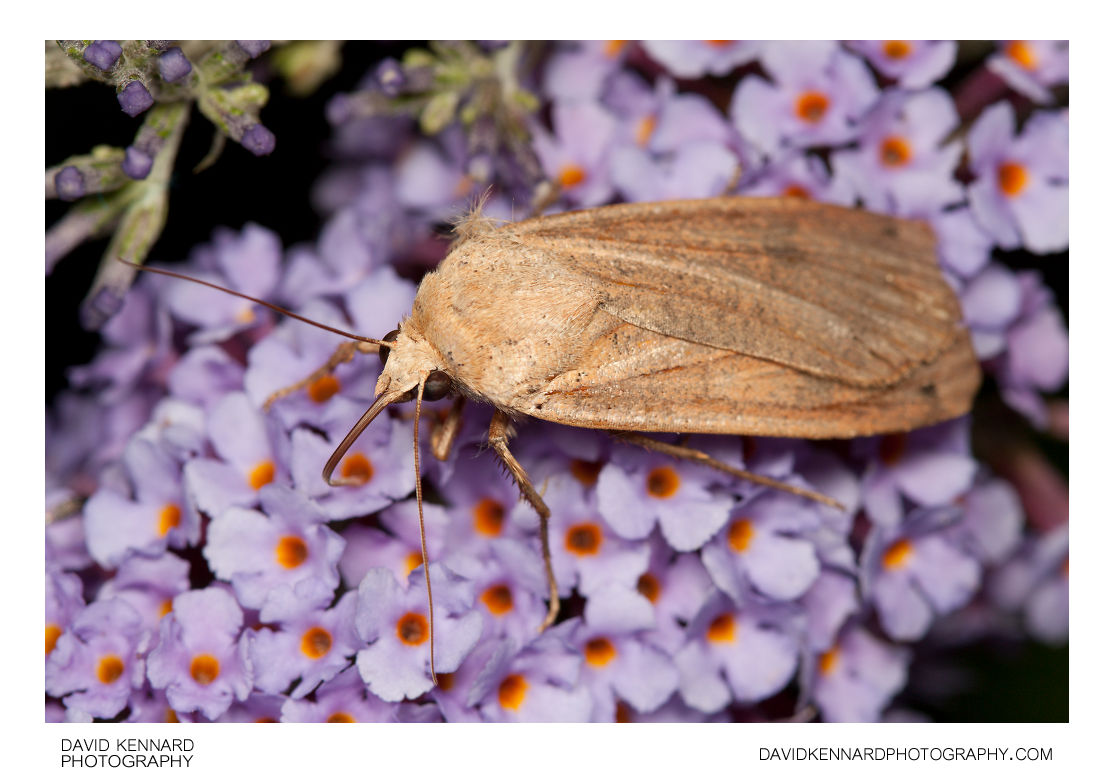Large Yellow Underwing moth (Noctua pronuba)

Description
- Title:
- Large Yellow Underwing moth (Noctua pronuba)
- Caption / Description:
-
A light brown colour form of the Large Yellow Underwing moth feeds on a buddleia bush in late September.
The Large Yellow Underwing (Noctua pronuba) is a moth, the type species for the family Noctuidae. It is an abundant species throughout Europe, one of the most common and most familiar moths of the region. In some years the species is highly migratory with large numbers appearing suddenly in marginal parts of the range.
This is a quite large and heavy moth with a wingspan of 50–60 mm. The forewings are quite variable from light brown to almost black. The darker individuals often have a pale streak along the costa. The hindwings are bright orange-yellow with a black sub-terminal band. As with other Noctua species (and numerous other insects), this contrast of drab-at-rest and bright-in-flight is used to confuse potential predators.
This species flies at night from July to September and is attracted to light, sometimes in huge numbers. It will also visit flowers such as Buddleia, ragwort and Red Valerian.
Description taken from Wikipedia: http://en.wikipedia.org/wiki/Noctua_pronuba
- Tags / Keywords:
-
- Biota
- Life
- Vitae
- Eukaryota
- Animalia
- Animals
- Arthropoda
- Arthropods
- Insecta
- Insects
- Lepidoptera
- Moths
- Noctuidae
- Owlet Moths
- Cutworms
- Noctua
- Yellow underwings
- Noctua pronuba
- Large Yellow Underwing
Admin
- Date Original Photo Taken:
- Original File Name:
- _MG_4951.CR2
- Event:
- Rating:
- ☆
- Date this image added/last updated on website:
- Original File Dimensions:
- 4272px x 2848px
- File Type:
- JPEG
- Color Mode:
- RGB
- Original Image Color Profile:
- Adobe RGB (1998)
Location
- Location Created:
-
- Sublocation:
- City:
- Market Harborough
- Province/State:
- Leicestershire
- Country:
- United Kingdom
- World Region:
- Europe
- Geo-location:
Rights
- Copyright Status:
- Copyrighted
- Licensing Status:
- Rights Managed
- Available for Editorial Use:
- Yes
- Available for Commercial Use:
- Yes
- Copyright Notice:
- © 2010 Dave Kennard
Camera Data
- Date Digital Resource was created:
- Shutter speed:
- 1⁄200 s
- Aperture:
- f/8
- Camera Model:
- Canon EOS 450D
- ISO:
- 100
- Exposure Compensation:
- 0
- Focal Length:
- 100mm
- Focal Length (35mm equiv.):
- Metering Mode:
- Multi-segment
- Flash:
- On, Fired
- Exposure Mode:
- Manual
- White Balance:
- Manual
- Light Source:
- Exposure Program:
- Manual
Additional shooting metadata
- Lens:
- Canon EF 100mm F2.8 Macro USM
- Filters used:
- Additional Optics used:
- Setup:
- Handheld
Canon MT-24EX Macro Twin Flash with home-made concave diffusers
Post Processing
- Image Modified:
- Software used:
-
- Adobe Camera RAW
- Post Processing:
Adjustment brush used in ACR to darken scales on top of moth's head
